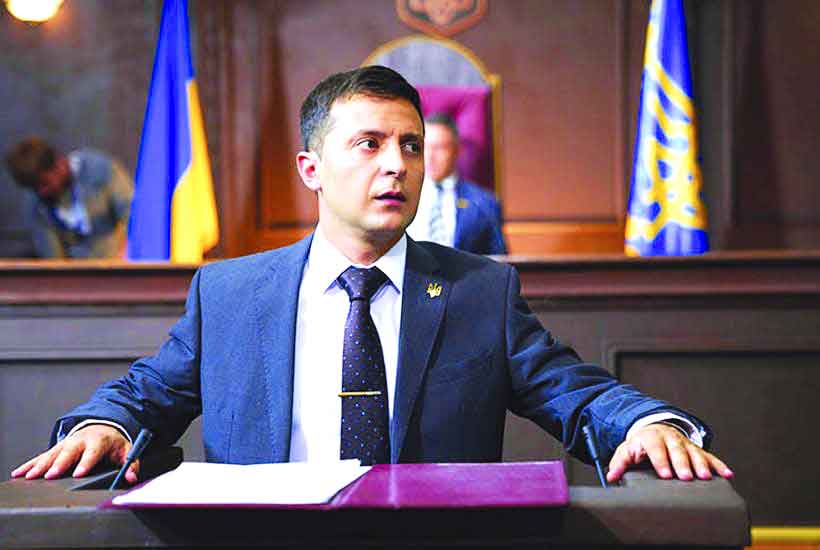Is Zelensky just a stalking horse behind which Kolomoysky can take control of Ukraine away from Poroshenko? Not necessarily. The two men may have a pragmatic alliance but their own separate agenda
Unlike comedian Alec Baldwin, who is famous for his impersonation of US President Donald Trump on Saturday Night Live, comedian Volodymyr Zelensky is famous for playing the anti-President, an accidental hero who sweeps into the presidency of Ukraine and cleans up all the corruption. He used to play it for laughs and now, he’s playing it for real.
Zelensky had been leading the opinion polls for the Ukrainian election that was held on March 31, with 25 per cent of the vote, well ahead of incumbent president Petro Poroshenko (12 per cent) and former Prime Minister Yulia Tymoshenko (18 per cent). (She’s the one who used to wear her hair in braids wound up around her head.) With no one expected to secure a majority, a runoff with the leading two candidates, Zelenskiy and Poroshenko will be held on 21 April. Baldwin will never be the US president, but there’s a good chance that Zelensky will be the Ukrainian president.
What a heart-warming story, I hear you murmur. Humble comedian plays even humbler high-school history teacher Vasyl Holoborodko, whose classroom diatribe against the corruption of Ukrainian politics was secretly filmed by a student. It goes viral on the internet and humble teacher is instantly elevated into the presidency by a grateful public.
The story gets even better. In real life, ‘Servant of the People’, the TV show about the teacher-turned-President, plays on the country’s biggest television channel, 1+1, and is a nation-wide hit. Then the guy playing the teacher, comedian Volodymyr Zelensky, decides that he has a chance of working the same miracle in real life. So he puts himself up for the presidency and lo! The public agrees.
This is not art imitating life; it is life imitating art. But if you are a nasty old cynic, who suspects the worst about people’s motives, then you are probably right, at least in this case. Zelensky is not just a simple comic who got lucky.
A little background. Ukraine is one of the less fortunate post-Soviet countries, with ageing heavy industries, few natural resources and barely a third of Russia’s per capita income (in terms of purchasing power parity). It has been mired in a low-intensity war with Russian proxies in its eastern provinces for the past five years and has lost Crimea to Russia for good.
You might think that in these circumstances, political debate would concentrate on ending the war and raising popular living standards but the war is barely mentioned and the main economic debate is about ‘corruption’.
That debate would make sense if it was really about cleaning up an extremely corrupt political system dominated by the ‘oligarchs’ (who also control most of the media). In practice, it is mainly a struggle between rival oligarchs, using accusations of corruption to target each other when in fact they are all corrupt almost by definition.
Poroshenko, a leading oligarch who won the election after the 2014 revolution, was at daggers drawn with Ihor Kolomoysky, the second-richest man in Ukraine, from the beginning of his presidency. In 2016, he nationalised Kolomoysky’s PrivatBank, the largest bank in the country, and Kolomoysky went into self-imposed exile in Israel while fighting Poroshenko’s actions in the courts and the media.
It was at this time that Kolomoysky and Volodymyr Zelensky, already a successful comedian with his own production company, began developing the TV series about the accidental president and it went on air on Kolomoysky’s 1+1 channel two years ago. It was an instant runaway hit and now Zelensky is the leading candidate for the real presidency.
Is Zelensky just a stalking horse behind which Kolomoysky can take control of Ukraine away from Poroshenko? Not necessarily. The two men may have a pragmatic alliance but their own separate agenda. But it is noteworthy that Zelensky showed up at Kolomoysky’s birthday party last year and was introduced as “our president”.
That large numbers of Ukrainians should fall for a fake maverick (who doesn’t even offer much in the way of concrete policies) is a measure of their disappointment with the status quo of rule by oligarchs behind a facade of democracy. Russia’s relative prosperity is mostly due to its oil but it also owes much to the fact that Vladimir Putin has brought its oligarchs under control. In Ukraine, their rivalries still dominate everything. There is not much reason to believe that Ukraine will finally turn the corner in this election and escape from the miseries and failures of its first three decades of independence. On the other hand, it’s not getting any worse either and for the moment the war in the east seems encysted and confined. Hope dies last and maybe Zelensky will surprise us.
(The writer’s new book is Growing Pains: The Future of Democracy and Work)




















